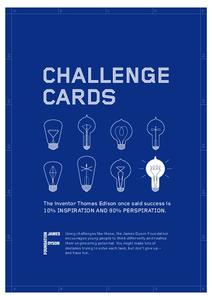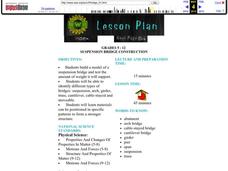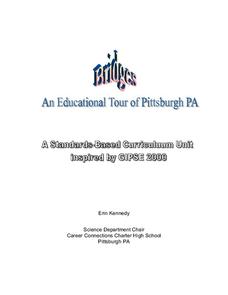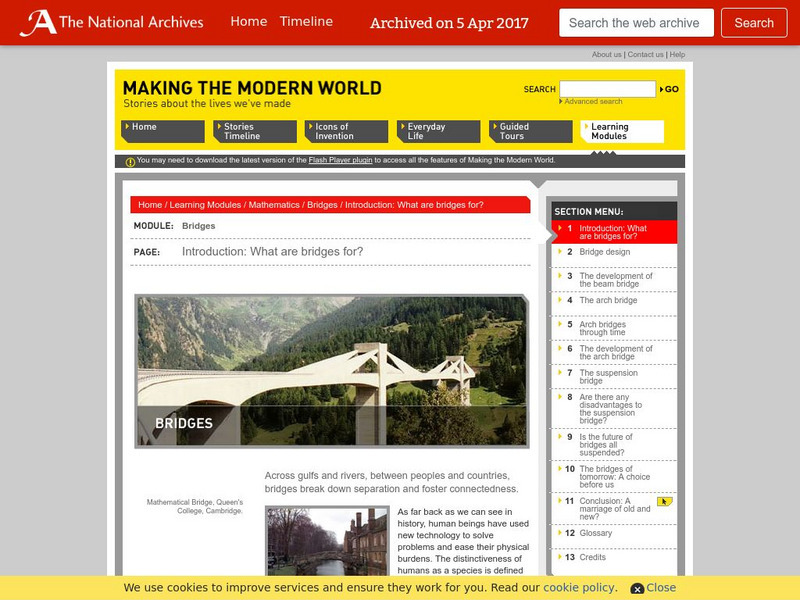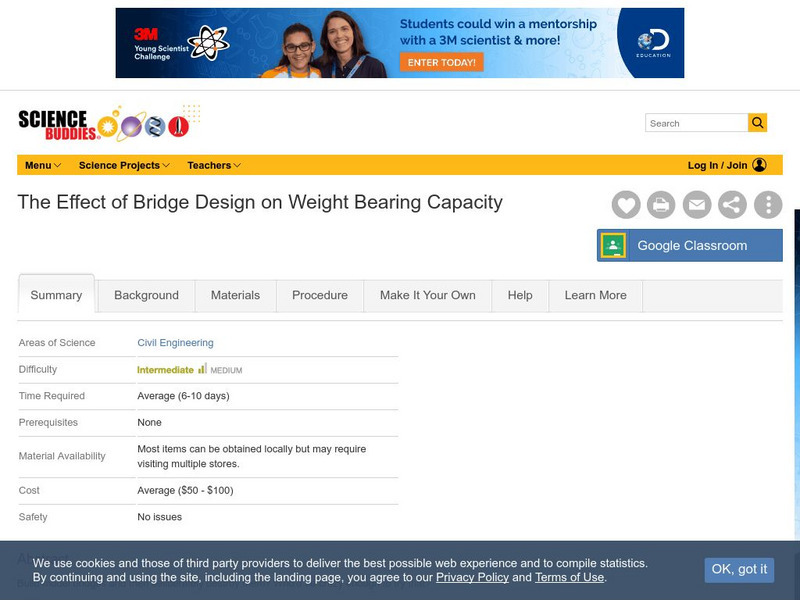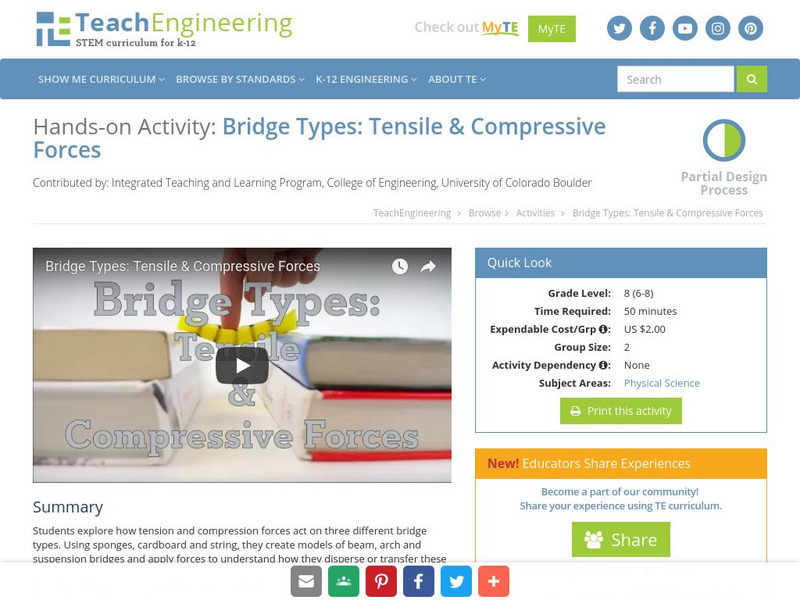Teach Engineering
Bridging the Gaps
The London Bridge should not have fallen down. And here's why. After a brief history of bridges and the three main types, class members are introduce to the concepts of tension and compression, the two main forces acting upon bridges.
Teach Engineering
Bridge Types: Tensile and Compressive Forces
Bridges rely on tension and compression to keep them standing. Pairs test this principle by constructing simple bridges and applying a force to the center. Teams use the provided worksheet to record their observations of the...
Cornell University
Bridge Building
Bridge the gaps in your knowledge of bridges. Individuals learn about bridge types by building models. The activity introduces beam bridges, arch bridges, truss bridges, and suspension bridges.
Cornell University
The Physics of Bridges
Stability is key when building a bridge. Scholars explore the forces acting upon bridges through an analysis of Newton's Laws and Hooke's Law. The activity asks individuals to apply their learning by building a bridge of their own.
DiscoverE
Bridges, Buildings and Beyond Activity Packet: Grades 3-5
The road to a better understanding of engineering lies with bridges and tunnels. A set of four engaging activities teaches learners about engineering concepts related to construction projects. They perform an experiment to find the...
Curated OER
Paper Suspension Bridges: You Want Me To Go Up There?
A few class periods will be required to complete this physics investigation with your high schoolers. There is an unavailable video written into the lesson plan, but there is plenty of material here to bridge the gap. Two terrific...
DiscoverE
Human Suspension Bridge
When is it okay to be suspended in school? When you're part of a human suspension bridge! Learners first model tension and compression in pairs. Once complete, they get together as a class to model a suspension bridge.
DiscoverE
Human Arch
Sometimes, we all need somebody to lean on. Scholars create a human arch by leaning against each other. They consider different approaches to making the arch sturdier and stronger.
Curated OER
Bridges
Students compare and contrast the three primary types of bridges. In this technology instructional activity, students design and build a bridge that spans 25 cm. They test their design and present the results to class.
Curated OER
Famous Bridges
Middle schoolers explain how significant bridges are in our lives. In this technology instructional activity, students research the history and characteristics of their assigned bridge and draw it on butcher block paper. They...
Curated OER
Construction Technologies: Construct the Strongest Bridge
Middle schoolers investigate how engineers use different types of bridges for different places. In small groups they design and construct bridges for three different scenarios, and answer a series of investigating questions applied to...
Curated OER
Bridge Construction
Students build a model of a bridge and test the amount of weight it support. They identify different types of bridges: suspension, arch, girder, truss, cantilever, cable-stayed and moveable.
Curated OER
Building Bridges
Students, in groups, design and test a scale bridge. They use the Internet to research three basic bridge designs -- beam, arch, and suspension -- and the forces that act upon them.
James Dyson Foundation
Challenge Cards
Can you build it? Yes you can! This interactive game includes four design challenges presented on separate cards. The cards outline the challenges with limited restrictions but with an end goal in mind. The competitions include building...
Curated OER
Suspension Bridge Construction
Students study types, strength and construction of a variety of bridges. They build a model bridge and test the amount of weight it support.
Curated OER
Building Your Bridge Building Basics
In this technology instructional activity, students examine the basic principles of bridge building design in order to answer the nine questions with the help of the web links on page 2.
Curated OER
Bridges
Students are introduced to the different types, designs and nature of bridges. They observe a historical look at the bridges in and around the Pittsburgh area through a video presentation. Connections are made between science and...
Curated OER
Shapes That Make Structures Strong
Learners study the various shapes engineers choose to make structures strong -- in particular, triangles, arches, and domes. They construct a variety of forms, and discuss how tension and compression are distributed by triangles,...
PBS
Pbs Learning Media: Build a Bridge
Survey potential bridge sites, research bridge design, and select the right bridge for the right location in this interactive activity from the NOVA: "Super Bridge" Web site.
Science Museum, London
Making the Modern World: Bridges
Learn all about bridges in this interactive learning module.
PBS
Pbs: Building Big: Bridges
A collection of resources about bridges that includes basic facts about bridges, challenges faced by bridge builders, famous bridges from around the world, and a lab that helps you understand how different forces affect bridge...
Science Buddies
Science Buddies: The Effect of Bridge Design on Weight Bearing Capacity
This Science Buddies project asks that you identify different kinds of bridges, discover why they are built as they are, and then build three different bridges of your own out of balsa wood. See which one you think can bear the heaviest...
PBS
Pbs Learning Media: Smart Bridges
In this video segment adapted from NOVA scienceNOW, learn about engineering innovations that could help detect a bridge's structural weaknesses before they become dangerous. [5:21]
TeachEngineering
Teach Engineering: Bridge Types: Tensile & Compressive Forces
Students explore how tension and compression forces act on three different bridge types. Using sponges, cardboard and string, they create models of beam, arch and suspension bridges and apply forces to understand how they disperse or...













